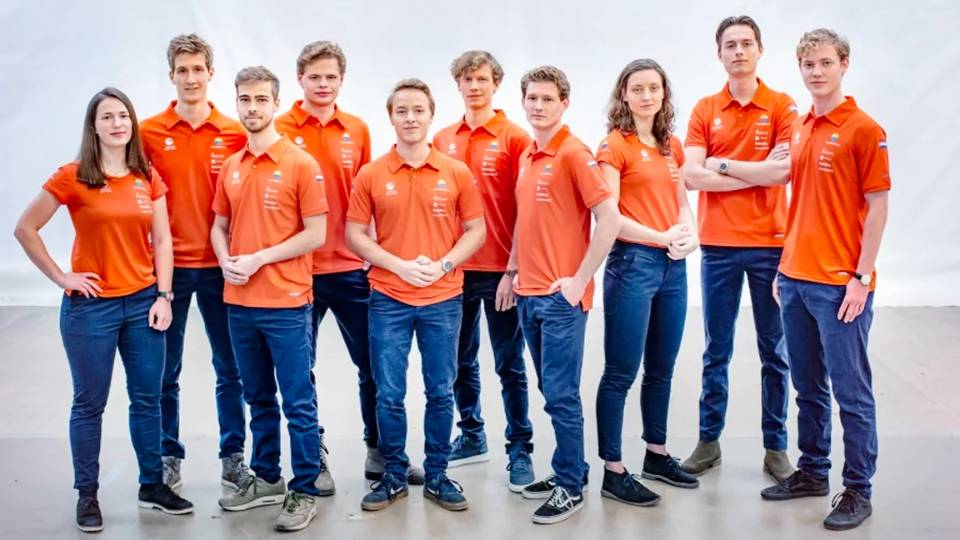Spotlight: Vattenfall Solar Team

Every week we talk to our customers about everything that motivates them as entrepreneurs. This week, Steven Mitchell from the Vattenfall Solar Team talks to us about their drive for solar races. The Vattenfall Solar Team consists of seventeen students from the Technical University in Delft, and participates since 2001 in solar races worldwide.
What does the Vattenfall Solar Team do?
Every year, a group of ambitious student from the Technical University of Delft designs and builds a new solar-powered racing car: the Nuna. Under the name Vattenfall Solar Team, the students take part in the worldwide solar races every year. They drive thousands of kilometres with their self-developed car, with the sun as their power source.
And besides the sun, their vision - to enable a fossil fuel-free life within one generation - is the only power the team needs!

Solar panels, already conceived - already done. What's innovative about it?
"What we see is that the development in the field of solar panels is going very fast. There have been so many developments in this field in the past 20 years, for example the first Nunas (the previously designed cars from Vattenfall) ran on gallium arsenide (GaAs) solar cells. Those were also used in satellites. The current solar cells that are now most commonly used on roofs, are silicon (Si) solar panels, and they are just as efficient as the first solar panels. Sustainability is not a sprint, but a marathon. You have to keep putting energy into it."
The results don't lie, you're the most successful team ever!
"We have won the races in Australia 7 times out of 10 (the most of everyone) and we have finished in 2nd place twice. In addition, we have won the South Africa Solar Challenge three times. This makes us indeed the most successful team ever. Unfortunately, we didn't win last year. The NunaX burned down 400 kilometers before the finish, while we were leading the way. We were of course very sorry and it also shows that it absolutely does take a lot of effort."
Do you know what caused the fire?
"The exact cause is not yet known, although we're still working on it. This year we aim for the most fire-safe Nuna ever."
I read something about Winning Factors, what exactly does this mean?
"Our wins happen because we use the 'nine winning factors'. These 9 winning factos were drawn up in 1999 in collaboration with Wubbo Ockels, the first Dutch Astronaut and a renowned physicist. It all starts with teamwork and the mindset, so how you interact with each other. We know exactly how each individual of the team works and what his or her role is. We also understand that everyone has a slightly different personality or background and we accept that from each other. That's how we complement each other. The aerodynamics are of course also very important. The air resistance of our Nuna is slightly smaller than the air resistance of a side mirror of a passenger car. So this is also an essential part."
So it's not easy to always build the winning car every year?
"That's right, it sometimes happens to us too. Of course everyone looks at each other and learns from each other. However, every year there are different regulations. For example, every four years there is a major change in regulations. That's this year, so that makes it extra exciting. Previously, you always had to drive with at least four wheels for stability. Then you had gallium arsenide solar panel, which is a very efficient solar panel. The rules will be different again next year. We then have to ride on three wheels and you have to use a silicon solar panel. Then, to get the same power as cars would have with gallium arsenide solar panels, you're allowed to put more square meters of solar panel on your car. So the solar panel and the car get bigger and you have less resistance because you can drive with three wheels."
Is there space to test in the Netherlands?
"Yes, all our production partners are here, which is why we build the car in the Netherlands. We do the testing in the Netherlands at our own workshop. We have developed a steel construction here, with which we can test the suspension and the electronics. We call it "Barry de Beunbak".
Furthermore, we can always test at the RDW site in Lelystad. Two or three months before the race, we ship the car to Australia. This way we can already prepare on location. We will already be racing double the number of kilometers of the race, backwards as a test case. That is 6,000 kilometers we already drive with the car. This way we test the car and all the systems and we already get to know the track. Testing is therefore an important part of the preparation."
You've set a world record (driving more than 924 kilometres in 12 hours) without a real race. What was the reason?
We were actually supposed to participate in the European Solar Challenge in Zolder, Belgium. Due to the corona crisis, we decided not to go here, although it wasn't cancelled.
We did not consider it responsible to go abroad with the entire team, precisely because we are socially aware and want to propagate that.

So we started looking for alternatives, in order to achieve a good performance with our car. We're always allowed to test drive on the RDW site in Lelystad, so we had the idea to create something beautiful with our team. Setting a world record seemed like a good way to show what our car can do. We arranged this in a very short time and are proud of this achievement. In this way we were still able to race with the car.
The year 2020
How has the pandemic impacted the Vattenfall Solar Team?
"We had registered to participate for the first time in the American Solar Challenge, which was to take place from July 18 to 25 in Oregon in America. Unfortunately, this was canceled due to Corona. We will basically continue as usual. Sustainability remains an important topic. You do notice that it is becoming more difficult to approach people and companies, everything just has to be a little different."
How is it now, to work together with 1.5 metres distance?
"Normally, we work in our own workshop. Quite a few people can fit in there. Now we are in the office with a maximum of 6 people. But, for us it is very important to keep talking to each other. We have many different disciplines within our team. That is why we have created an online workshop. We use Discord for this, which is a really nice program. With this you can, as it were, walk into someone and talk to each other as if it were real life. We try to organise it in such a way after every lunch break that two people from different disciplines are obliged to talk to each other. This way you ensure that people continue to communicate with each other and to talk about something other than work. That way you get to know each other much better.
In addition, we hold a 'crazy Thursday' every two weeks, two team members are then appointed to come up with a fun thing to do together."
What are you most proud of?
"Not the first moment you think of 'pride', but that's when the Nuna10 burned down. This was a terrible moment for everyone. But it is just so beautiful and special to see how the team still remains one and comes to the finish with a smile. This while they have just seen their dream fall apart.
It shows so much resilience! So which is now our 9th winning factor added by this event. That is what we are most proud of!"




